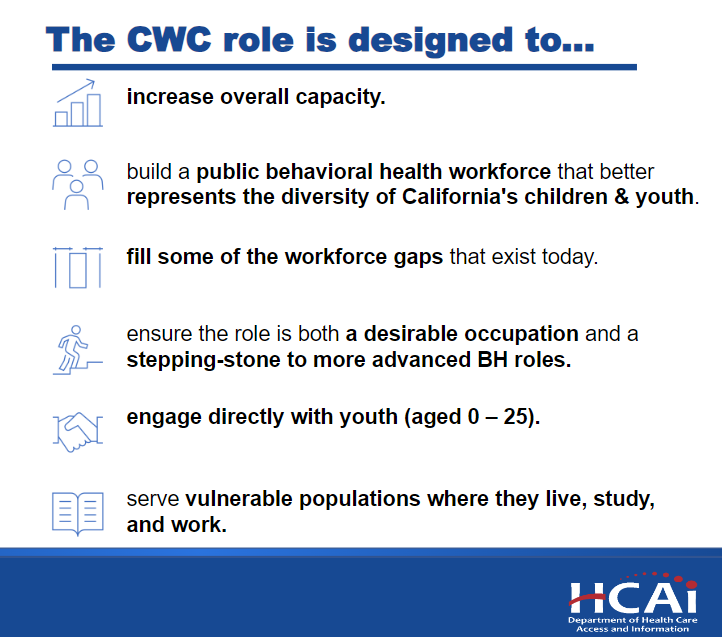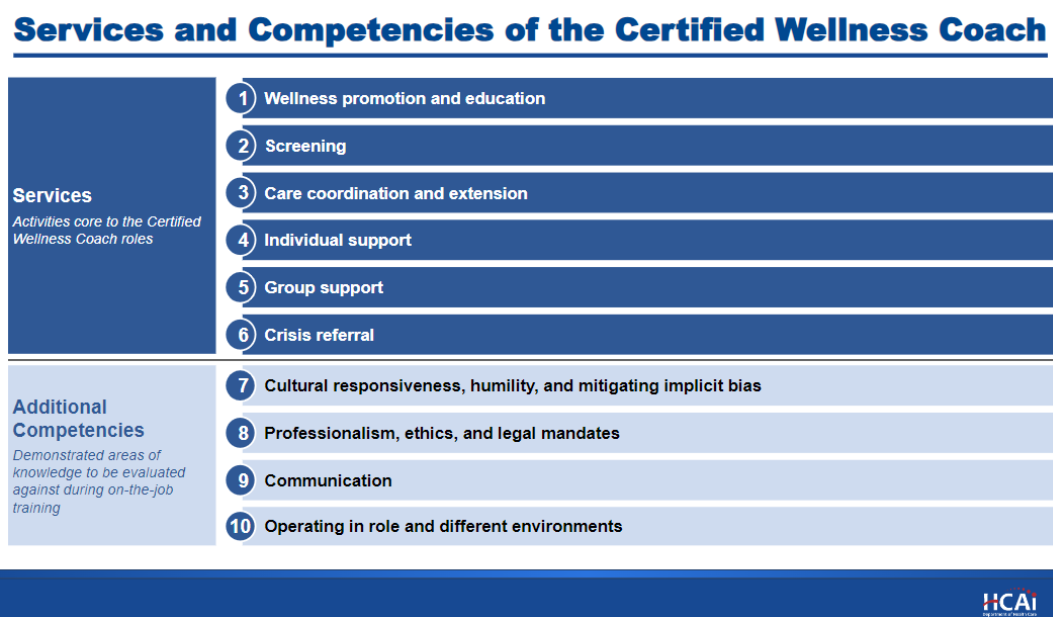A key component of California’s Child & Youth Behavioral Health Initiative is the launch of the Certified Wellness Coach (CWC) workforce.
The California Department of Health Care Access and Information (HCAI) received $338 million through CYBHI to design and build the CWC workforce.
The CWC role was developed to increase California’s overall capacity to support the growing behavioral health needs of the state’s children and youth.
An important aspect of this initiative is bringing more supportive adults into schools who better represent and have more shared lived experiences with the vibrantly diverse backgrounds and experiences of California’s children and youth—providers who children and youth can connect with, who speak their language, and understand their communities.
Currently, there are limited employment opportunities in the behavioral health workforce for individuals who do not have an advanced degree.
The CWC role is meant to fill in some of this gap and provide both a desirable occupation as well as a stepping stone for those that want to continue on to a more advanced behavioral health role, such as becoming a Licensed Clinical Social Worker (LCSW) or Licensed Marriage and Family Therapist (LMFT).
Two Pathways to Becoming a CWC
- The Workforce Pathway is for those currently working in mental health, substance use/addiction, social work, or child welfare, and who have an associate’s or bachelor’s degree in a Social Work, Health and Human Services, Addiction Studies, Child Development/Early Intervention, Psychology or Sociology.
- The Education Pathway is for prospective applicants that are newly or currently enrolled in college, or recently graduated from high school. Applicants need to have, or be working towards, an associate or bachelor degree in Health & Human Services, Social Work, or Addiction Studies.
Depending on the level of education achieved, there will be two classifications:
- CWC I, with an AA degree
- CWC II, with a bachelor’s degree
Both pathways require field experience hours to become certified, ranging from 400-2,000 hours.
HCAI is working with state universities as well as community colleges to develop the CWC training program.
Services & Competences of the Certified Wellness Coach
Potential activities of CWCs in a school-based health and wellness center might include:
Wellness Promotion & Education
- Classroom presentations on wellness skills, social emotional learning (SEL) competencies, mindfulness, evidence-based stress busters, substance use prevention, social skills, bullying prevention, suicide prevention
- Lead campus wellness activities such as stress busters, mental health literacy, and cultural healing practices
- Promote activities to address mental health stigma
- Build rapport with students, staff, and parents
- Serve as wellness champion on campus with schoolwide visibility
Screening
- Support implementation of universal mental health/wellness student screening
- Targeted screening for specific groups of students
- Triage students who need Tier 2 or 3 interventions following screening
- Refer students to appropriate in school supports within the school or school-based health and wellness center
- Develop schoolwide wellness promotion activities based on screening data
Care Coordination
- Support in case management in coordination with behavioral health clinicians
- Navigate needed external referrals (providing support with scheduling appts, facilitating communication, reminders, addressing transportation barriers)
- Connect students/families to basic needs in the community (food, housing support, utility support, legal support)
- Support with linking students and families to Medi-Cal enrollment, including education on eligibility, application support, coordination with Medi-Cal office, support with re-certifications
- Liaise with school staff and school-based health and wellness staff around specific student need
- Participate in Coordination of Services Team (COST) meetings
- Develop strong relationships with internal and external partners to facilitate culturally appropriate service
- Provide student advocacy in accessing needed support
Individual support
- Check-in and check-out for drop-in wellness centers, support students to choose a self-regulation station (calming space) in the wellness center
- Support students individually in school-based health and wellness centers with mental health education, healthy relationships support, and other health topics
- Provide emotional support to students in school-based health and wellness centers, and identify students needing a higher level of emotional support and provide warm hand-offs
- Assess students on social determinants of health and other concerns using non-clinical assessment tools
- Monitor student participation in behavioral health care through outreach, referral linkage, and by addressing barriers to participation
- Motivational Interviewing to support stages of change around substance use or other risky behaviors
Group Support
- Coordinate and lead non-clinical skill-building groups— mindfulness, anger management, socialization groups, stress management, wellness practices
- Lead or co-lead culturally-specific or gender specific groups—(i.e. Black girls group, ESL students, LGBTQ+ students)
- Partner with SBHC&WC mental health provider to support therapeutic groups, both administratively and through group participation.
- Support and co-facilitate school peer-to-peer programs, such as Peer Mentoring, Peer Counseling, Peer Education in partnership with mental health provider/teacher.
- Facilitate restorative justice circles and/or work with students to facilitate peer-lead mediation and peer restorative justice.
- Serve as coordinator of school-based health and wellness center Youth Advisory Board, mental health student club, (NAMI on Campus, Bring Change to Mind).
- Oversee student workers in school-based health and wellness centers, provide training and guidance.
Crisis Referral
- Participate as part of school’s crisis response team
- Participate in post-vention activities following a school tragedy, such as healing circles, re-entry circles
- Promote and coordinate school-wide healing activities and culture building following a school tragedy
- Trained in Youth Mental Health First Aid
- QPR-trained for crisis intervention (Question, Persuade, Refer)
Multi-Year Timeline
Training and certification for qualified applicants will launch in Early 2024.
Education programs for students will launch in 2024, as well as some student scholarship opportunities.
The Certified Wellness Coach Employer Support Grant Program will open for applications in January 2024, with grant deadline in March 2024.
The purpose of the Employer Support Grant Program is to provide resources to organizations to integrate Certified Wellness Coaches into their teams and enhance services for children and youth.
Plans to have Certified Wellness Coaches added to the Multi-Payer Fee Schedule in early 2025 are underway, which will allow for reimbursement of services through Medi-Cal and commercial insurance in school-linked and school-based settings.
While only some of the duties of a CWC will likely be reimbursable, there is potential revenue to help support these positions into the future.
Next Steps
For those interested in becoming a Certified Wellness Coach
- Visit the CWC website to determine which pathway and requirements apply to you
- Sign up for updates on the CWC website to be notified when scholarships become available.
For schools, health care organizations or community organizations interested in hiring Certified Wellness Coaches
- Visit the CWC website to learn about the Certified Wellness Coach Employer Support Grant Program (deadline for first round of funding is March 15, 2024.
- Sign up for updates on the CWC website.
- Spread the word about CWCs to people in your communities who may be interested in pursuing certification.





